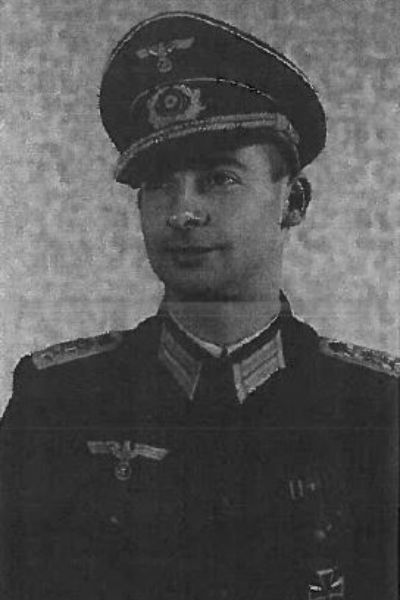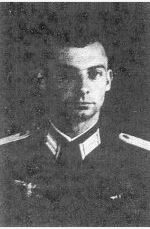Otto, Herbert (Gren.Reg.90)
- Date of birth:
- August 30th, 1908 (Leipzig, Germany)
- Nationality:
- German
Biography
Otto was born on August 30, 1908 in Leipzig, Saxony.
In 1930, Otto began training at the National Police. In the autumn of 1935, already promoted to senior sergeant of the state police, was the obligation and the acquisition in the German Wehrmacht in the rank of corporal. On October 2, 1936 he received the service award 4th class for 4 years of faithful service in the Wehrmacht. On October 1, 1937, he was promoted to sergeant during the training of the Wehrmacht in Hamburg Harburg.
Award of the medal to the ,, 1. October 1938 "on January 9, 1940 during the preparation for the Western campaign in Hamburg.
In February 1940, the Inf. Reg. 90 moved to Belgium, where Otto was awarded by a gunshot wound the wounded badge in black shortly after his promotion to lieutenant. On June 7, 1940, as lieutenant in Matagne-la-Petite the Iron Cross 2nd class was awarded. The first recorded front days of Lieutenant Otto are listed on 14.06.1940 as "Attack in the Forest of Bournonville" (France).
The Russian campaign began. First recorded combat day in close combat was the 24.06.1941 in the "attack on Stakliskiai"
or outstanding achievements in the field on 17 August 1941 he was awarded the Iron Cross 1st class. On September 1, 1940, the promotion to Oberleutnant.
The infantry storm badge was awarded to Otto in the field on October 7, 1941 after 12 days at the front. More front and melee days are recorded. 1 April 1942, Lieutenant Otto is promoted to captain in the field. Further front and melee days in the Russian field. On February 1, Captain Otto was promoted to Major. Herbert Otto received the German Cross in Gold on April 28, 1944, for outstanding achievements in troop leadership. Shortly before this ceremony, he was proposed to the Knight's Cross as confirmed by letters from the regimental commander. On October 27, the nomination followed in the Ehrenblatt of the German Army. At this time, Major Herbert Otto, commander of the 3rd Battalion Grenadier Regiment 90, and his men had excelled in an exceptional way in the fight. Awarded the melee clasp in bronze on 8.6.1944. At this time, the battalion battled back across Belarus to Lithuania, towards the borders of the homeland. Awarded the 2nd level of the melee clasp in silver on 2.7.1944.
This month various fighting took place in the Krystynopol area. Group Otto received the order to secure a strategically important bridge. Fierce fighting took place around the bridge. Many brave men lost their lives. On August 16, 1944, he was again hit by an enemy bullet and received for his three-time wounding the wounded badge in silver.
Shortly thereafter, Major Otto was called to teach as a tactics teacher. Letters show that he disapproved of this decision made by the regiment. Major Otto came on 13.5.1945 in Russian prisoner of war from which he was released on 1.5.1950 and returned home. In 1951 he was taken to the Bundeswehr. Until his death he lived with his son (also a sergeant in the German Armed Forces) in Cologne.
1.4.1930 Pol. Candidate Police School Sensburg / Ostpreussen
1.4.1931 Pol. constable
1.4.1935 Pol. Main Watchtower State Police Hamburg Harburg
Autumn 1935 NCO (takeover of Wehrmacht)
1.10.1937 Sergeant
1.2.1940 Lieutenant
1.9.1940 Lieutenant Company Commander
1.4.1942 Captain Battalion Leader
1.2.1944 Major Battalion Commander
13.5.1945 wounded in Russian captivity
1.5.1950 over camp Friedland released from captivity
Do you have more information about this person? Inform us!
- Period:
- Second World War (1939-1945)
- Awarded on:
- February 16th, 1940
- Period:
- Second World War (1939-1945)
- Awarded on:
- June 7th, 1940
- Period:
- Second World War (1939-1945)
- Awarded on:
- August 17th, 1941
- Period:
- Second World War (1939-1945)
- Awarded on:
- October 7th, 1941
- Period:
- Second World War (1939-1945)
- Awarded on:
- July 24th, 1942
- Period:
- Second World War (1939-1945)
- Rank:
- Hauptmann (Captain)
- Unit:
- Führer, III. Bataillon, Grenadier-Regiment (motorisiert) 90, 20. Panzergrenadier-Division, Heer
- Awarded on:
- April 28th, 1944
- Period:
- Second World War (1939-1945)
- Awarded on:
- June 8th, 1944
- Period:
- Second World War (1939-1945)
- Awarded on:
- July 2nd, 1944
- Period:
- Second World War (1939-1945)
- Awarded on:
- August 16th, 1944
- Period:
- Second World War (1939-1945)
- Rank:
- Major
- Unit:
- Führer, III. Bataillon, Grenadier-Regiment (motorisiert) 90, 20. Panzergrenadier-Division, Heer
- Awarded on:
- October 27th, 1944
Sources
- Photo 1: Alric Leibnitz
- - PATZWALL, K. & SCHERZER, V., Das Deutsche Kreuz 1941-1945, Band II, Verlag Klaus D. Patzwall, Norderstedt, 2001.
- Ehrenblattspange Newspaper Excerpt.
- Scheibert, Horst. Die Träger der Ehrenblattspange des Heeres und der Waffen-SS/ Die Träger der Ehrentaffelspange der Kriegsmarine/ Die Inhaber des Ehrenpokals für Besondere Leistung im Lukftkrieg. Friedberg, Ger.: Podzun-Pallas Verlag, 1986, ISBN 3-7909-0283-7
- Axis History Forum via Awardholders / unit
- Alric Leibnitz
- Der Freiheitskampf (29 November 1944)















